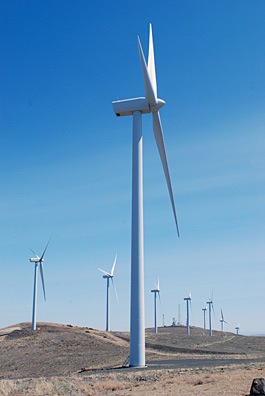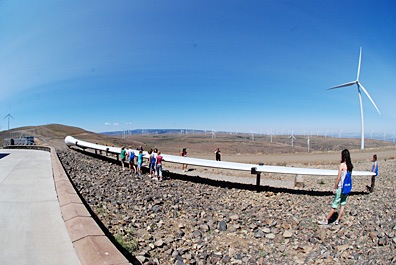A visit to Washington’s other source of alternative energy.
Washington state is widely known for its cheap, reliable electric power. One reason it’s cheap is because it’s hydroelectric — the Columbia and other rivers in Washington have been dammed up with numerous hydroelectric plants, many of them built as part of the New Deal in the 1930s. (An interesting side note here: we visited the Grand Coulee Dam and learned on the tour that power wasn’t one of the reasons the dam was originally built. The two primary reasons were irrigation and flood control. I really ought to write about that tour in another post.)
Anyway, Washington is also on the leading edge of renewable power generation from wind generators or windmills. Puget Sound Energy (PSE) has two facilities, one of which is on a series of ridges in Kittitas County, 18 miles east of Ellensburg. This Wild Horse Wind Facility is clearly visible from my camp just south of Quincy, about 20 air miles away. It’s also open to the public for tours. So on Saturday afternoon, feeling a dire need to get away from the book project I’m working on, I headed out to see the place close up.
It’s easy to get to. From I-90, take the exit for Vantage, which is on the west side of the Columbia River. After stopping for a burger at Blustery’s, head up the old Vantage Highway. You’ll get to the turn for Wild Horse about 12 miles up the road. It’s hard to miss — the road is clearly marked and you can see lots of windmills from the main road.
 Follow the entrance road about three miles as it winds up a hill. You’ll pass a bunch of windmills along the way — the road actually passes quite close to a few of them. Eventually, you’ll see the Visitor Center at the top of the site. Behind it are a few windmills that, when seen with the building in front, look absolutely enormous.
Follow the entrance road about three miles as it winds up a hill. You’ll pass a bunch of windmills along the way — the road actually passes quite close to a few of them. Eventually, you’ll see the Visitor Center at the top of the site. Behind it are a few windmills that, when seen with the building in front, look absolutely enormous.
When I arrived, an all-girls camp group was there. The girls were in their early teens. I managed to latch on to one of their tours, which included a walk up eight or so steps into the tower at the bottom of one of the windmills. Afterward, I wandered around a bit, got technical information about the facility, and took plenty of photos.
 Want some stats? The facility is on a 9,000 acre site overlooking the Columbia River Basin. It was started up in December 2006 with 127 wind turbines. Each turbine is capable of producing up to 1.8 megawatts of power in 31 mph winds, for a total of 229 megawatts. The turbines start generating power at 9 mph of wind and are programmed to feather their blades and basically shut down when winds exceed 56 mph to avoid damage. Since the site is usually pretty windy, the facility does a pretty good job generating power.
Want some stats? The facility is on a 9,000 acre site overlooking the Columbia River Basin. It was started up in December 2006 with 127 wind turbines. Each turbine is capable of producing up to 1.8 megawatts of power in 31 mph winds, for a total of 229 megawatts. The turbines start generating power at 9 mph of wind and are programmed to feather their blades and basically shut down when winds exceed 56 mph to avoid damage. Since the site is usually pretty windy, the facility does a pretty good job generating power.
Each turbine sits atop a 221-foot tall tower. (See the flight of steps at the very bottom of the tower in this photo? It has about 8 steps. That should give you an idea of scale.) The foundations go down 25 to 32 feet and each have 120 anchor bolts around the 13-foot wide tower base. The bolts are huge, as you might imagine.
The turbines, which are manufactured in Denmark, generate power at 690 volts. A transformer inside the turbine housing, steps up the power to 34.5 kilovolts. These turbines are atop the tower (of course) and are about the size of a typical RV or motorhome. They’re reached from a ladder inside the tower.
 The blades are also huge. There was one on display outside the visitor center and I snapped a photo with my fisheye lens (which explains the distortion) of the girls gathered around it. Each of a windmill’s three blades is 129 feet long, 11.6 wide near the hub, and 1.6 feed wide at the tip. They’re made of composite materials, are hollow, and weigh 7 tons each. When you figure the length of the rotor blade into the total maximum height of the windmill, you get 351 feet.
The blades are also huge. There was one on display outside the visitor center and I snapped a photo with my fisheye lens (which explains the distortion) of the girls gathered around it. Each of a windmill’s three blades is 129 feet long, 11.6 wide near the hub, and 1.6 feed wide at the tip. They’re made of composite materials, are hollow, and weigh 7 tons each. When you figure the length of the rotor blade into the total maximum height of the windmill, you get 351 feet.
It’s no wonder I can see them from 20 miles away.
We all know that the environmentalists are concerned about windmills and their impact on birds and bats. I asked about this. I was told that the facility averages 2 dead birds per turbine per year. I think more are killed being hit by cars. The folks at Wild Horse take the situation seriously and collect and bag all birds found. Bats are not an issue there.
For me, the most amazing part of visiting the windmills was the sound they made as they were spinning.
After my tour in the Visitor Center vicinity, I hopped on the truck and followed the dirt road around the facility. I was out to take photos and I got a few interesting ones.
If you’re in the area, I recommend a visit to the Wild Horse Wind Facility. Try calling 888-225-5773 if you need more info; I can’t seem to find the official Web site for the facility.
And if there’s a wind or other alternative energy facility open to the public for tours in your area, make it a point to visit with your kids. It’s a great way to learn about energy options.
Discover more from An Eclectic Mind
Subscribe to get the latest posts sent to your email.

There’s a YouTube video here of people base jumping off wind turbines like these. Walking right out onto the blades (stopped, of course) hundreds of feet in the air.
Thanks for your informative site. My wife and I saw a lot of these windmill blades on semi trucks, heading west on I-40 near Nashville, TN. I thought that’s what they were, but they were much longer than I expected. We had seen some of these windmills while on an earlier vacation out west, but seeing one blade on the trailer of a truck was fascinating. Of course, these were over-size trailers. The first time we saw the blades in July ’08, there was only one per trailer. Several weeks later in August ’08, we made the same trip on I-40 and then they had two blades per trailer. I suppose there is either a lot of windmill construction, or some serious blade replacement going on.
Why are we buying these things from Denmark…cant we make them here in the US? The administration talks about creating green jobs (I though that meant in the US) but as usual it’s just more political talk.
@Dave
It gets worse. I heard recently that China has developed state-of-the-art wind generating technology. So soon we’ll likely be buying from China.